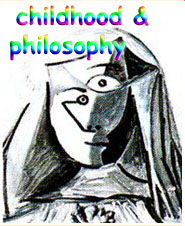following philosophy with children concepts in practice of teacher education
DOI:
https://doi.org/10.12957/childphilo.2019.44574Keywords:
philosophy with children, teacher education, pedagogy of reflection and dialogueAbstract
Teacher-student dialogue plays a central role in facilitating the ongoing growth of those engaged in education, particularly dialogue that invites student reflection on the instruction being given and the teacher herself. Dialogue should aid students in articulating self-awareness (conscious or unconscious) regarding their behaviour and learning habits and the learning process and its results at the same time as assessing their quality and the ways in which they may be improved. One of the reasons behind our increasing inability to break down the inherent barrier between teachers and students is due to a lack of engagement in ongoing dialogical reflection as a means of advancing the teaching-learning process within the school. This article summarizes the philosophical concepts of a ten years of teacher education program which was designed according to the principals of Philosophy with Children. The program fostered creativity and self-reflective thinking in schools and in teacher education and offered dialogical methods. It is based also on six dimensions that are the basis of Philosophy with Children: learning from a place of questions, community of learning that resists the educational hierarchy that boasts of omniscience, coordinator as a participant in the learning process, learning in the real present, legitimization of improvisation as a way of learning , learning as liberating the learner from disciplinary boundaries. All six dimensions view Philosophy with Children as a pedagogy of searching at whose center lies the pursuit of meaning that facilitates personal development—and thus self-direction and capability.
Downloads
References
Alrø, H., & Skovsmose, O. (2004). Dialogue and learning in mathematics education - intention, reflection, critique. Dordrecht: Kluwer Academic Publishers.
Bohm, D. (1992). Thought as a System. London: Routledge.
Bohm, D. (1996). On Dialogue. New York: Routledge.
Buber, M. (1938/1962). The Problem of Man: A Philosophical Anthropological Investigation. Jersusalem: Mosad Bialik (Hebrew).
Burbules, N. C. (1991). “Varieties of educational dialogue.” In: David Ericson (ed.) Philosophy of Education. Normal, Ill.: Philosophy of Education Society, pp. 120-131.
Burbules, N. C. (1993). Dialogue in Teaching: Theory and Practice. New York: Teachers College Press.
Burbules, N. C., & Rice, S. (1991). Dialogue across differences: Continuing the conversation. Harvard Educational Review, 61(4), pp. 393-416.
Freire, P. (1970). Pedagogy of the Oppressed. NY: Continuum.
Gadamer, H. G. (1999). Truth and Method. New York: Continuum.
Goodlad, J. I. (1984). A Place Called School. New York: McGraw-Hill.
Goodlad, J. I. (1990). Teachers for Our Nation’s Schools. San Francisco: Jossey Bass.
Goodlad, J. I. (1994). Education Renewal: Better Teachers, Better Schools. San Francisco: Jossey Bass.
Gover, N. (2008). The Fereirean dialogue: Empowerment, libaretion, political literacy and social solidarity. In: N. Aloni (Ed.) Empowering Dialogues in Humanistic Education. Tel Aviv: Hakibbutz Hameuchad, pp. 195 - 213 (Hebrew).
Heckmann, G. (1981). Das Sokratische Gesprach: Erfahrungen in Philosophischen Hochschulseminaren. Hannover: H. Schroedel.
Isaacs, W. (1999). Dialogue and the Art of Thinking Together. New York: Doubleday.
Kizel, A. (2013). “Clashing Narratives in Civic Education in Israel.” Global Education Review 1 (3), 70–74
Kizel, A. (2016). “Philosophy with Children as an Educational Platform for Self-Determined Learning.” Cogent Education 3 (1), 1244026 https://doi.org/10.1080/2331186X.2016.1244026
Kizel, A. (2016a). Pedagogy out of fear of philosophy as a way of pathologizing children. Journal of Unschooling and Alternative Learning, 10(20), 28–47.
Levine, M. (2001). Standards for Professional Development Schools. Washington, DC: National Council for Accreditation of Teacher Education.
Lipman, M., Sharp, A. M., & Oscanyan, F. S. (1980). Philosophy in the Classroom. Philadelphia: Temple University Press.
Manen, M. van (1991) The Tact of Teaching; The Meaning of Pedagogical Thoughtfulness. Albany: State University of New York Press.
Marshall, H. (1990). Beyond the work place metaphor: The classroom as a learning setting. Theory in Practice, 29, pp. 94-100.
Nelson, L. (1949). Socratic Method and Critical Philosophy: Selected Essays. New Haven: Yale University Press.
Peters, R. S. (1966). Ethics and Education. New York: Scott, Foresman and Company.
Senge, P. (1994). The Fifth Discipline Fieldbook: Strategies and Tools for Building a Learning Organization. New York: Nicholas Brealey.
Shulman, L. S. (1986). Those who understand: Knowledge growth in teaching, Educational Researcher, 15, pp. 4-14.
Sirotnik, K. A. (2001). Renewing Schools and Teacher Education: An Odyssey in Educational Change. Washington, DC: AACTE Pub.
Slotte, S. (2004). Dialogue and systems intelligence: A work philosophy. In R. P. Hämäläinen & E. Saarinen (Eds.), Systems Intelligence: Discovering a Hidden Competence in Human Action and Organizational Life (pp. 39-55). Helsinki: Helsinki University of Technology.
Tynjälä, P., Välimaa, J. and Sarja A. (2003). Pedagogical perspectives on the relationships between higher education and working life. Higher Education 46 (2): 147 – 166.
Wegerif, R. (2008). Reason and dialogue in education. In: B.van Oers, E. Elbers, W. Wardekker, R. van der Veer (Eds.) (2008). The Transformation of Learning: Advances in Cultural-Historical Activity Theory. Cambridge: Cambridge University Press, pp. 273 – 288.
Zilberstein, M., Ben Perez, M., & Grienfeld, N. (2006). New Trends in Teacher Education Curriculum: Partnership between Colleges and Schools: The Israeli Story. Tel Aviv: Mofet (Hebrew).



